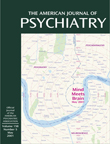Partial Versus Full Hospitalization for Adults in Psychiatric Distress: A Systematic Review of the Published Literature (1957–1997)
Abstract
OBJECTIVE: The authors reviewed published research that compared partial and full hospitalization as alternative programs for the care of mentally ill adults, with the goal of both systematizing the knowledge base and providing directions for future research. METHOD: Studies published since 1950 were obtained through manual and electronic searches. Results were stratified by outcome domain, type of measure used to report between-group differences (global, partial, or rate-based), and time of assessment. Effect sizes were computed and combined within a random-effects framework. RESULTS: Eighteen investigations published between 1957 and 1997 were systematically reviewed. Over half of eligible patients were excluded a priori; diagnostic severity of enrollees varied widely. On measures of psychopathology, social functioning, family burden, and service utilization, the authors found no evidence of differential outcome in the selected patient population admitted to the studies reviewed. Rates of satisfaction with services suggested an advantage for partial hospitalization within 1 year of discharge, with the gap being largest at 7–12 months. CONCLUSIONS: Although partial hospitalization is not an option for all patients requiring intensive services, outcomes of partial hospitalization patients in these studies were no different from those of inpatients. Further, patients and families were more satisfied with partial hospitalization in the short term. Weaknesses of the studies limited the scope of our inquiry and the generalizability of findings. Positive findings require replication under the present circumstances of mental health care, and more research is needed to identify predictors of differential outcome and successful partial hospitalization. A clearer definition of partial hospitalization will help consolidate its role in the continuum of mental health services.



